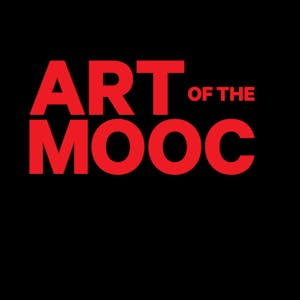ART of the MOOC Activism and Social Movements
This course is for activists, artists, and thinkers who wish to better understand and participate in social change. We will focus on the prolific and exciting overlap between socially engaged art and cultural practices generated by recent social movements around the world. Rather than assess the political efficacy of activities like mourning, listening, organizing, dancing, or partying, the lectures examine such cultural activities next to, and within, contemporary art practice. Included in the course are guest presentations by key artists, activists, and scholars, like: Rebecca Gomperts, Chido Govera, Gulf Labor, Hans Haacke, Sharon Hayes, Jolene Rickard, Gregory Sholette, Joshua Wong, and many more. Designed by artist and Duke professor, Pedro Lasch and co-taught by Creative Time artistic director, Nato Thompson, the course challenges learners to treat the MOOC itself as a social and artistic form. This happens mostly through the practical components, local project productions, global exchanges, and critical feedback.
While no prior art making or activist experience is required, projects also offer challenging options for advanced learners.
For other course offerings or language versions in this series, just search ‘ART of the MOOC’ inside the Coursera course catalogue.
None
Syllabus
Syllabus - What you will learn from this course
Week 1
Introduction to Activism and Social Movements
Week 2
Activism and Social Movements: Lectures, Guest Presentations, and Quiz
Week 3
Activism and Social Movements: Project and Peer Review
Week 4
Aesthetics, Art History, and Cultural Institutions - Lectures, Guest Presentations, and Quiz
Week 5
Aesthetics, Art History, and Cultural Institutions: Project and Peer Review
Week 6
Embodied Knowledges - Lectures, Guest Presentations, and Quiz
Week 7
Embodied Knowledge: Project and Peer Reviews
FAQ
When will I have access to the lectures and assignments?
Access to lectures and assignments depends on your type of enrollment. If you take a course in audit mode, you will be able to see most course materials for free. To access graded assignments and to earn a Certificate, you will need to purchase the Certificate experience, during or after your audit. If you don't see the audit option:
The course may not offer an audit option. You can try a Free Trial instead, or apply for Financial Aid.
The course may offer 'Full Course, No Certificate' instead. This option lets you see all course materials, submit required assessments, and get a final grade. This also means that you will not be able to purchase a Certificate experience.
What will I get if I purchase the Certificate?
When you purchase a Certificate you get access to all course materials, including graded assignments. Upon completing the course, your electronic Certificate will be added to your Accomplishments page - from there, you can print your Certificate or add it to your LinkedIn profile. If you only want to read and view the course content, you can audit the course for free.
Is financial aid available?
Yes. In select learning programs, you can apply for financial aid or a scholarship if you can’t afford the enrollment fee. If fin aid or scholarship is available for your learning program selection, you’ll find a link to apply on the description page.
Will I receive a transcript from Duke University for completing this course?
No. Completion of a Coursera course does not earn you academic credit from Duke; therefore, Duke is not able to provide you with a university transcript. However, your electronic Certificate will be added to your Accomplishments page - from there, you can print your Certificate or add it to your LinkedIn profile.
Reviews
This has been literally the best educational experience.
A great course to be part of. a good learning experience
Exciting, different & eye-opening. Innovative assessment strategy (once it opens)!
I plan to go back and rewatch some guest lessons and look at the materials in the future.
